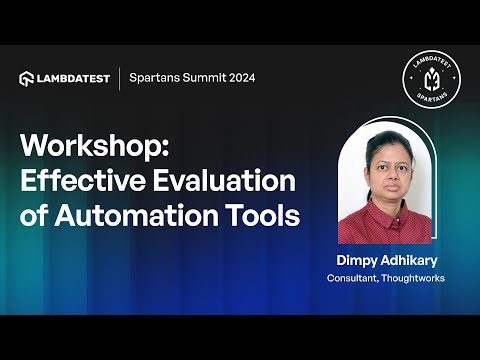Join Dimpy Adhikary, Consultant at Thoughtworks, in this workshop for a clear understanding of vital factors - technical specs, cost, ease of use, and community support. Learn a simple framework to compare tools and tackle real-world issues objectively.
Still not registered? Hurry up and grab your free tickets: Register Now!
If you have registered and are up for the session, please post your questions in the thread below. 
Here are some of the questions poured in from the attendees:
How do you ensure that your chosen automation tool aligns with your project’s specific needs?
To automate legacy desktop-based applications, which open-source tools can we choose with good community support?
What are the top three factors you consider when evaluating automation tools?
Many tools are available in the market, both open-source and commercial, with emerging AI options. while AI tools have the potential to streamline automation efforts, How should someone aspiring to become an Automation Engineer proceed?
(sorry if this was already discussed or not relevant) Which tool best integrates/aligns with AI for a team with non-technical skills?
RPA or open source tools, what would you choose for a small expanding team? Since I’ve seen so many problems with RPA (such as inactive elements after recording), I assumed it wasn’t very dependable. How do you feel?
What role does community support play in your evaluation of automation tools?
How do you handle situations where multiple tools seem equally suitable for a project?
What’s one key takeaway we should remember when selecting automation tools for projects?
How do we deal with the Business aspect while evaluating tools? technical aspects could still be taken as a part of POC
Should we consider the tech stack used for developing the application while choosing the right automation framework/tools?
Is Cypress going to be widely used in per future aspects?
Dimpy: Make sure the automation tool you pick matches your project’s needs by thoroughly examining its features, compatibility, scalability, and support for your tech stack.
Dimpy: To automate legacy desktop-based applications, consider tools like AutoIt, WinAppDriver, and SikuliX with strong community support. They’re ideal for desktop interfaces.
Dimpy: When evaluating tools, focus on functionality, compatibility, ease of use, and support availability to ensure they meet your project needs.
Dimpy: For small expanding teams, open-source tools offer flexibility and cost-effectiveness, but RPA tools can be advantageous in specific scenarios. Consider complexity and long-term maintenance.
Dimpy: Community support is vital for troubleshooting and sharing best practices when evaluating tools.
Dimpy: When multiple tools are suitable, prioritize features, integration ease, learning curve, and long-term support for informed decisions.
Hi there,
In case you missed the live session, no problem at all! You can check out the recording right here:
Additionally, we’ve got you covered with a detailed session blog:
![]()
